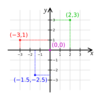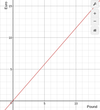3.3 - Graphs Flashcards
I can plot points (x, y) in any of the four quadrants of a graph
For example, I can plot (2, 3), (-3, 1), (0, 0) and (-1.5, -2.5)

I can workout the midpoint of a line segment, given its endpoints
For example, if a line segment goes from (5, 10) to (-3, 6), its midpoint is…
(1, 8)
I can read a straight line graph to convert between two units
For example, given the following graph, how many Euros is 7 pounds?

8 euros
I can find the gradient of a straight line
For example, what is the gradient of this line?

gradient = (increase in y) ÷ (increase in x)
= -4 ÷ 2
= -0.5I can find the gradient of a straight line given the coordinates of two points
For example, what is the equation of the straight line through (1, 7) and (2, 9)?
gradient = (increase in y) ÷ (increase in x)
= 2 ÷ 1
= 2
calculate the intercept by substituting into y = mx + c
y = mx + c 7 = 2 × 1 + c 7 = 2 + c c = 5
Equation of the line: y = 2x + 5
Given one line, I can find the gradient of another perpendicular line
If the gradient of the first line is m, then the gradient of the second line is -1 ÷ m
I know what the equation of a line is
y = mx + c
- m is the gradient of the line
- c is the point where the line crosses the y-axis.
What is the equation of the straight line with gradient 6 that passes through the point (0, 2)?
y = 6x - 2
What does the line x = 5 look like?
A vertical line passing through (5, 0)
What does the line y = 3 look like?
A horizontal line passing through (3, 0)
What does the line y = x look like?
A diagonal line with gradient 1, passing through (0, 0) and (1, 1)
Goes from bottom left to top right.
What does the line y - x = 0 look like?
A diagonal line with gradient -1, passing through (0, 0) and (1, -1)
Goes from top left to bottom right.
Given a formula, I can plot a graph
Draw out a results table for different values of y:
y | 0 | 1 | 2 | 3 | ... x | 2 | 4 | 8 | 16 | ...
Plot the points on a graph, and join up with a curve
Given a graph of y = f(x), I can sketch y = f(2x)
It will be squashed in the horizontal direction, so each point is half as far from the y-axis
Given a graph of y = f(x), I can sketch y = 2f(x)
It will be stretched out in the vertical direction, so each point is twice as far from the x-axis
Given a graph of y = f(x), I can sketch y = 2 + f(x)
It will be shifted two up
Given a graph of y = f(x), I can sketch y = f(x + 2)
It will be shifted two to the left
I can estimate the gradient of a non-linear graph
Draw a tangent at the point you are interested in (with a ruler)
Calculate the gradient of the tangent like any other straight line
I can look at the intersections of lines to solve complex equations
For example, this is a graph of y = x + 4/x - 3
How would you use it to solve the equation 5x + 4/x - 3 = 0?

- Rearrange the equation so that it contains the equation of the graph:
0 = 3x + 4/x + 13 0 = ( x + 4/x - 3) + 2x - 10
- Substitute in y and rearrange to put y on the left
0 = ( x + 4/x - 3) + 2x - 10 0 = y + 2x - 10 y = -2x + 10
- Draw this new line
- The x-coordinates where the two lines intersect show the solutions

Given one line, I can find the gradient of another parallel line
They will be the same


